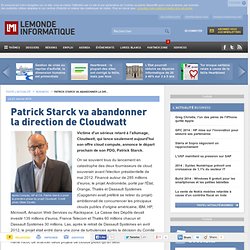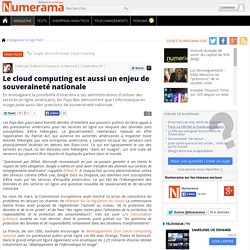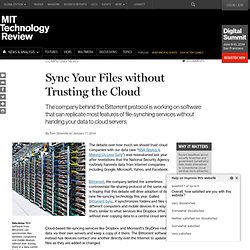Zoom
Trash

11 cacm. Les bases de l'informatique en nuage. Gérald Fillion - L'a b c de l'informatique en nuage. #11: Benjamin André - Cozy Cloud · redecentralize.org. Kindly transcribed by: David Hansen Francis Irving: Hello!

Welcome to a Redecentralize interview with Benjamin André from Cozy Cloud. He’s in Paris, France. Hello Benjamin! Benjamin André: Hello! Francis: So can you tell us a little bit about Cozy Cloud? Benjamin: Cozy Cloud is your personal cloud, your private home server, on which you can have all your personal data, and also your own web services running on your personal cloud.
Francis: So what kind of things does it let you manage? Benjamin: Yes, exactly. Francis: Oh, so people write applications on top of Cozy Cloud that do different things? Benjamin: Yes, yes. Francis: Yes! Benjamin: So here — you should see my screen — this is the login of your personal cloud, of your Cozy instance. Francis: So just to clarify — this is on cozycloud.cc, so that’s like a hosted version of the open-source Cozy software. Benjamin: Yes, exactly. Francis: Oh, so the app store is much like a mobile phone app store; it has lots of programs on it. Patrick Starck va abandonner la direction de Cloudwatt. Après Compaq, HP et CA, Patrick Starck a porté la première phase du projet Cloudwatt.

Crédit photo Olivier Ezratty Victime d'un sérieux retard à l'allumage, Cloudwatt, qui lance seulement aujourd'hui son offre cloud compute, annonce le départ prochain de son PDG, Patrick Starck. On se souvient tous du lancement en catastrophe des deux fournisseurs de cloud souverain avant l'élection présidentielle de mai 2012. Financé autour de 285 millions d'euros, le projet Andromède, porté par l'État, Orange, Thalès et Dassault Systèmes (Capgemini avait préféré se retirer du projet) ambitionnait de concurrencer les principaux clouds publics d'origine américaine, IBM, HP, Microsoft, Amazon Web Services ou Rackspace.
La Caisse des Dépôts devait investir 135 millions d'euros, France Telecom et Thalès 60 millions chacun et Dassault Systèmes 30 millions. Numergy a-t-il pris l'avantage sur Cloudwatt ? Le cloud computing est aussi un enjeu de souveraineté nationale. Les Pays-Bas pourraient bientôt décider d'interdire aux pouvoirs publics de faire appel à des prestataires américains pour les services en ligne sur lesquels des données sont susceptibles d'être hébergées.

Le gouvernement néerlandais redoute en effet l'application du Patriot Act, qui autorise les autorités américaines à inspecter toute donnée hébergée par une entreprise américaine, y compris lorsque les serveurs sont physiquement localisés en dehors des Etats-Unis. Ce qui est typiquement le cas des services en cloud, où les données sont hébergées "dans les nuages", sur une nuée de serveurs qui peuvent être répartis et dupliqués partout dans le monde. "Questionné par ZDNet, Microsoft reconnaissait en juin ne pouvoir garantir à ses clients le respect de cette obligation.
Google a admis en août avoir transféré des données aux services de renseignements américains", rappelle ZDNet.fr. Cloudwatt : Bercy demande un audit sur un possible fiasco. From Bittorrent: A Way to Sync Your Files without Entrusting Them to the Cloud. The debate over how much we should trust cloud companies with our data (see “NSA Spying Is Making Us Less Safe”) was reawakened last year after revelations that the National Security Agency routinely harvests data from Internet companies including Google, Microsoft, Yahoo, and Facebook.

Bittorrent, the company behind the sometimes controversial file-sharing protocol of the same name, is hoping that this debate will drive adoption of its new file-syncing technology this year. Called Bittorrent Sync, it synchronizes folders and files on different computers and mobile devices in a way that’s similar to what services like Dropbox offer, but without ever copying data to a central cloud server. Cloud-based file-syncing services like Dropbox and Microsoft’s SkyDrive route all data via their own servers and keep a copy of it there. The Bittorrent software instead has devices contact one another directly over the Internet to update files as they are added or changed.